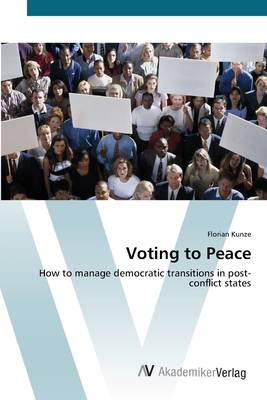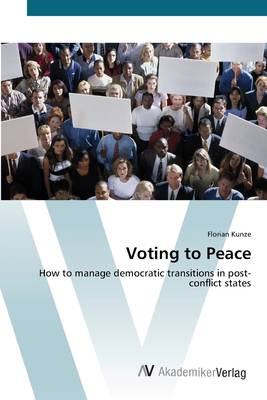
- Afhalen na 1 uur in een winkel met voorraad
- Gratis thuislevering in België vanaf € 30
- Ruim aanbod met 7 miljoen producten
- Afhalen na 1 uur in een winkel met voorraad
- Gratis thuislevering in België vanaf € 30
- Ruim aanbod met 7 miljoen producten
Zoeken
Voting to Peace
How to manage democratic transitions in post-conflict states
Florian Kunze
Paperback | Engels
€ 60,95
+ 121 punten
Omschrijving
Revision with unchanged content. Since the end of the Cold War the number of civil wars with following peace- and state-building attempts has significantly increased. In line with the third wave of democratization theory more and more states try to establish a mar-ket democracy after the end of domestic conflict. But is a rapid transition with immediate elections really the one best way to end domestic conflict? Recent examples of Afghanistan and Iraq show that elections are by no means an endpoint for domestic conflict within war-torn societies, but rather an accelerator for ethnic violence. Therefore to introduce primarily stable institutions, like rule of law and a functioning bureaucracy, before organizing democratic elections, seems to be a more promising strategy. The author Florian Kunze investigates this hypothesis, first through a quantitative analysis of 35 cases, and second through an in depth analysis of three case studies: Namibia, Liberia, and South Africa. This book addresses researches and students of international relations, politi-cians, development workers and military staff faced with state building tasks, and all other interested in the issue of democratic transition after domestic conflict.
Specificaties
Betrokkenen
- Auteur(s):
- Uitgeverij:
Inhoud
- Aantal bladzijden:
- 116
- Taal:
- Engels
Eigenschappen
- Productcode (EAN):
- 9783639405026
- Verschijningsdatum:
- 4/05/2012
- Uitvoering:
- Paperback
- Formaat:
- Trade paperback (VS)
- Afmetingen:
- 152 mm x 229 mm
- Gewicht:
- 181 g

Alleen bij Standaard Boekhandel
+ 121 punten op je klantenkaart van Standaard Boekhandel
Beoordelingen
We publiceren alleen reviews die voldoen aan de voorwaarden voor reviews. Bekijk onze voorwaarden voor reviews.







